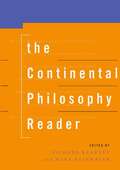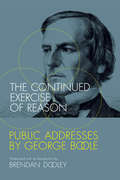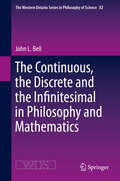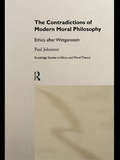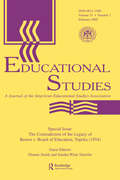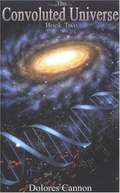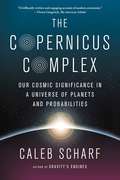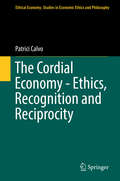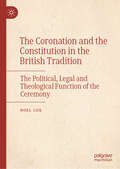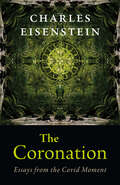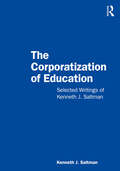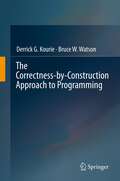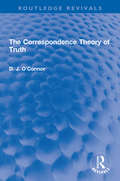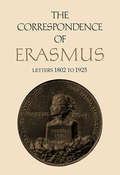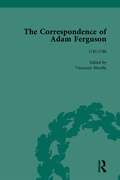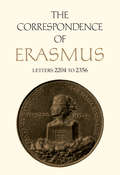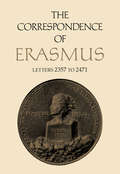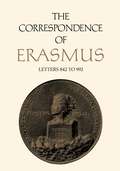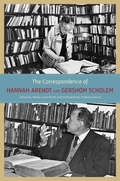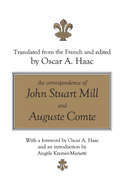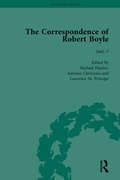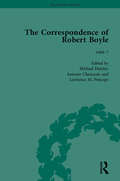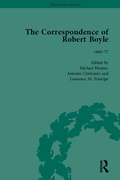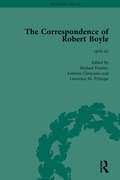- Table View
- List View
The Continental Philosophy Reader
by Richard Kearney Mara RainwaterFirst Published in 1995. Routledge is an imprint of Taylor & Francis, an informa company.
The Continued Exercise of Reason: Public Addresses by George Boole (The\mit Press Ser.)
by Brendan DooleyLectures, many never before published, that offer insights into the early thinking of the mathematician and polymath George Boole.George Boole (1815–1864), remembered by history as the developer of an eponymous form of algebraic logic, can be considered a pioneer of the information age not only because of the application of Boolean logic to the design of switching circuits but also because of his contributions to the mass distribution of knowledge. In the classroom and the lecture hall, Boole interpreted recent discoveries and debates in a wide range of fields for a general audience. This collection of lectures, many never before published, offers insights into the early thinking of an innovative mathematician and intellectual polymath.Bertrand Russell claimed that “pure mathematics was discovered by Boole,” but before Boole joined a university faculty as professor of mathematics in 1849, advocacy for science and education occupied much of his time. He was deeply committed to the Victorian ideals of social improvement and cooperation, arguing that “the continued exercise of reason” joined all disciplines in a common endeavor. In these talks, Boole discusses the genius of Isaac Newton; ancient mythologies and forms of worship; the possibility of other inhabited planets in the universe; the virtues of free and open access to knowledge; the benefits of leisure; the quality of education; the origin of scientific knowledge; and the fellowship of intellectual culture. The lectures are accompanied by a substantive introduction by Brendan Dooley, the editor of the volume, that supplies biographical and historical context.
The Continuous, the Discrete and the Infinitesimal in Philosophy and Mathematics (The Western Ontario Series in Philosophy of Science #82)
by John L. BellThis book explores and articulates the concepts of the continuous and the infinitesimal from two points of view: the philosophical and the mathematical. The first section covers the history of these ideas in philosophy. Chapter one, entitled ‘The continuous and the discrete in Ancient Greece, the Orient and the European Middle Ages,’ reviews the work of Plato, Aristotle, Epicurus, and other Ancient Greeks; the elements of early Chinese, Indian and Islamic thought; and early Europeans including Henry of Harclay, Nicholas of Autrecourt, Duns Scotus, William of Ockham, Thomas Bradwardine and Nicolas Oreme. The second chapter of the book covers European thinkers of the sixteenth and seventeenth centuries: Galileo, Newton, Leibniz, Descartes, Arnauld, Fermat, and more. Chapter three, 'The age of continuity,’ discusses eighteenth century mathematicians including Euler and Carnot, and philosophers, among them Hume, Kant and Hegel.Examining the nineteenth and early twentieth centuries, the fourth chapter describes the reduction of the continuous to the discrete, citing the contributions of Bolzano, Cauchy and Reimann. Part one of the book concludes with a chapter on divergent conceptions of the continuum, with the work of nineteenth and early twentieth century philosophers and mathematicians, including Veronese, Poincaré, Brouwer, and Weyl.Part two of this book covers contemporary mathematics, discussing topology and manifolds, categories, and functors, Grothendieck topologies, sheaves, and elementary topoi. Among the theories presented in detail are non-standard analysis, constructive and intuitionist analysis, and smooth infinitesimal analysis/synthetic differential geometry.No other book so thoroughly covers the history and development of the concepts of the continuous and the infinitesimal.
The Contradictions of Modern Moral Philosophy: Ethics after Wittgenstein (Routledge Studies in Ethics and Moral Theory #Vol. 1)
by Paul Johnston Dr Paul JohnstonThe Contradictions of Modern Moral Philosophy is a highly original and radical critique of contemporary moral theory. Paul Johnston demonstrates that much recent moral philosophy is confused about the fundamental issue of whether there are correct moral judgements. He shows that the standard modern approaches to ethics cannot justify - or even make much sense of - traditional moral beliefs. Applied rigorously, these approaches suggest that we should reject ethics as a set of outdated and misguided claims. Rather than facing up to this conclusion, most recent moral philosophy consists of attempts to find some ways of preserving moral beliefs. This places a contradiction at the heart of moral philosophy. As a resilt it is often impossible to tell whether a contemporary philosopher ultimately rejects or endorses the idea of objective right and wrong. On the basis of a Wittgenstein approach Paul Johnston puts forward an alternative account of ethics that avoids this contradiction and recognises that the central issues of ethics cannot be resolved by conceptual analysis. He then uses this account to highlight the contradictions of important contemporary moral theorists such as Bernard Williams, Alasdair MacIntyre, Thomas Nagel and Charles Taylor.
The Contradictions of the Legacy of Brown V. Board of Education, Topeka (1954): A Special Issue of Educational Studies
by Dianne Smith Sandra Winn TutwilerOn May 17, 1954, the Supreme Court ruled that separate school facilities were inherently unequal and thus unconstitutional and illegal. Today, 50 years after this landmark decision, much debate surrounds the efficacy of the ruling, particularly for its impact on the education of children of color in U.S. schools. In reality, Brown v. Board of Education of Topeka, Kansas, was never solely about education; neither did the case include only plaintiffs from Topeka. Both points are important to note as we reflect on the legacy of Brown a half century after the ruling. This journal offers articles, an interview, book reviews and a media review around this area.
The Convoluted Universe: Book Two
by Dolores CannonBuckle your seat belts and get ready for another roller coaster ride that will present new concepts and either threaten or expand your belief systems. Dolores Cannon continues to uncover complicated metaphysics, creating the need for sequels. Included in this book: Hidden Underground Cities; Energy and Creator Beings; Time Portals for Travelling Between Dimensions; Life on Other Planets; The Universal Language of Symbols; Splinters and Facets of the Soul; Raising of Vibrations and Frequencies to Shift into the New Earth; Characteristics of the New Earth.
The Copernicus Complex: Our Cosmic Significance in a Universe of Planets and Probabilities
by Caleb ScharfNicolaus Copernicus dared to go against the establishment by proposing that Earth rotates around the Sun. Having demoted Earth from its unique position in the cosmos to one of mediocrity, Copernicus set in motion a revolution in scientific thought. <P><P>This perspective has influenced our thinking for centuries. However, recent evidence challenges the Copernican Principle, hinting that we do in fact live in a special place, at a special time, as the product of a chain of unlikely events. But can we be significant if the Sun is still just one of a billion trillion stars in the observable universe? <P><P>And what if our universe is just one of a multitude of others-a single slice of an infinity of parallel realities? In The Copernicus Complex, the renowned astrophysicist Caleb Scharf takes us on a scientific adventure, from tiny microbes within the Earth to distant exoplanets, probability theory, and beyond, arguing that there is a solution to this contradiction, a third way of viewing our place in the cosmos, if we weigh the evidence properly. <P><P>As Scharf explains, we do occupy an unusual time in a 14-billion-year-old universe, in a somewhat unusual type of solar system surrounded by an ocean of unimaginable planetary diversity: hot Jupiters with orbits of less than a day, planet-size rocks spinning around dead stars, and a wealth of alien super-Earths. Yet life here is built from the most common chemistry in the universe, and we are a snapshot taken from billions of years of biological evolution. <P><P>Bringing us to the cutting edge of scientific discovery, Scharf shows how the answers to fundamental questions of existence will come from embracing the peculiarity of our circumstance without denying the Copernican vision. <P><P> With characteristic verve, Scharf uses the latest scientific findings to reconsider where we stand in the balance between cosmic significance and mediocrity, order and chaos. <P><P> Presenting a compelling and bold view of our true status,The Copernicus Complex proposes a way forward in the ultimate quest: determining life's abundance, not just across this universe but across all realities.
The Cordial Economy - Ethics, Recognition and Reciprocity (Ethical Economy #55)
by Patrici CalvoThis book proposes, from a civil perspective —such as that developed by Stefano Zamagni— and a cordial perspective —such as that developed by Adela Cortina—, orientations to design an economy in tune with what the historical moment demands. Among other things, this comes from encouraging institutions, organisations and companies to include in their designs aspects as important for carrying out their activities as cordial reciprocity, mutual recognition of the communicative and affective capacities of the linked or linkable parties, public commitment and the active participation of civil society.The book first shows the conceptualisation of the process of self-interest as operating for one’s own benefit and its inclusion in the orthodox economic model. In Chapter 2 it then displays some of the logical/formal and experimental limits of the axiomatic economics model to discover the possibility of building bridges between theoretical modelling and factual validation. Chapter 3 demonstrates the fragility of a rationality model based on the paradigmatic figure of homo oeconomicus. Chapter 4 reflects on the critical process that has identified reciprocity as a determining factor for human cooperation, turning this behaviour into a paradox in which the lack of a reasonable explanation from the selfish perspective becomes inconsistent in the predominant economic theory. Chapter 5 is from a moral point of view it describes and criticises the different approaches to reciprocity observed by sociologists, biologists, psychologists and economists. Chapter 6 analyses three mutual recognition proposals as possible foundations for human cooperation, highlighting one of them –cordial recognition, developed by Cortina– because it is more closely related to studies of reciprocity, particularly the most recent contributions from the neurosciences. Chapter 7 proposes cordial reciprocity as a horizon of meaning for the various approaches to reciprocity observed. Chapter 8 explores the possible emergence and development of cordial goods, a type of relational and communicative good that enables joint actions to take place in different contexts of human activity. Chapter 9 analyses the application and implementation of cordial reciprocity at the macro, meso and micro levels of the economy. And finally, it proposes guidelines for designing a monitoring and compliance system which, based on the communication, storage and processing of big data and the committed participation of stakeholders, offers businesses the possibility of inspecting their underlying dimensions of morality, emotions and responsibility.
The Coronation and the Constitution in the British Tradition: The Political, Legal and Theological Function of the Ceremony
by Noel CoxThis book examines the legal, political and theological functions of the British coronation. Coronations as understood in the traditional western European sense, are, in those countries which remain monarchies, increasingly rarely found, though they are far from extinct. They indeed may be seen as an exceptional survival of a vanishing era, an age dominated by kingship and Christianity – although some non-Christian kingdoms retain, have adopted, or once had, comparable inaugurations. But the coronation, as the term is generally understood, is a unique hybrid of election, tribal inauguration, political acknowledgment and sacred setting apart, which make its legal, political and theological roles highly significant. The fact that the United Kingdom is one of the few monarchies which retain coronations does not diminish the importance of the coronation – indeed, rather the opposite. The country is also the last of the great monarchies of Europe, so it would perhaps be surprising if it did not retain such a ritual and solemnity. It is in the context of its historical setting, the theological and political underpinnings and rationale, and indeed a more modern sociological understanding of the role of ritual, that the importance of the coronation as a constitutional ritual of the highest importance is to be understood, and therefore its necessity may be considered.
The Coronation: Essays from the Covid Moment
by Charles Eisenstein"There are moments in our history in which the art of the written word captures the extraordinary beauty of the human condition as it hangs suspended in tenuous polarity at a tipping point of evolution. The Coronation is one of these moments."—Zach Bush, MDControversy and despair, hope and isolation, courage and division, withdrawal and reunion. How can we find meaning as we emerge from the troubled time of Covid?In The Coronation, social philosopher Charles Eisenstein presents key building blocks of post-Covid sense-making. These unforgettable essays narrate the disintegration of an old normal, and old reality, even, Eisenstein says, an old mythology. Controversial when they first appeared, these essays—with new introductions to each by the author—ring with relevancy as the charge dissipates from previously hot-button issues. Now, as we survey the post-Covid landscape, we have the opportunity to build something more sound, more whole, and more sane. Individually, these essays have been read, shared, and discussed by tens of thousands of people around the globe, but are collected together and bound here for the first time.The Coronation brings new clarity to a vital question whose time has come: What world shall we choose now?"An intelligent, compassionate, and uncompromising book . . . without falling into either partisan hysteria or a shameless defense of power. This is a necessary and brave read."—Paul Kingsnorth, author of The Wake2023 Nautilus Book Award Gold Medal Winner: Rising To The Moment-Focused Topic: COVID Pandemic
The Corporatization of Education: Selected Writings of Kenneth J. Saltman
by Kenneth J. SaltmanKenneth J. Saltman is a defining voice within Education, and for 25 years he has worked to uncover the ways in which public education has been impacted by corporatization and neoliberalism, and to demonstrate what educators and citizens can do to reclaim the democratic purpose of schooling. His work is unique in the way that it bridges a number of traditions, theoretical perspectives, and ranges in scope across the discipline, while at the same time translating crucial concepts in an accessible writing style.In this timely collection, Saltman introduces 11 of his most influential writings across his career with new contextual information for each piece. The volume is framed by a new introduction and conclusion by the author, which re-examine the scope of his work, discuss the larger development of the field over time, and considers what is still to be done.This important work will be crucial to researchers and graduate students in Education courses, particularly within Educational Foundations, Sociology of Education, and Education Policy Studies. The book’s interdisciplinary nature means that it will also be highly beneficial for those studying or researching within Sociology, Communications, and Politics.
The Correctness-by-Construction Approach to Programming
by Bruce W. Watson Derrick G. KourieThe focus of this book is on bridging the gap between two extreme methods for developing software. On the one hand, there are texts and approaches that are so formal that they scare off all but the most dedicated theoretical computer scientists. On the other, there are some who believe that any measure of formality is a waste of time, resulting in software that is developed by following gut feelings and intuitions. Kourie and Watson advocate an approach known as "correctness-by-construction," a technique to derive algorithms that relies on formal theory, but that requires such theory to be deployed in a very systematic and pragmatic way. First they provide the key theoretical background (like first-order predicate logic or refinement laws) that is needed to understand and apply the method. They then detail a series of graded examples ranging from binary search to lattice cover graph construction and finite automata minimization in order to show how it can be applied to increasingly complex algorithmic problems. The principal purpose of this book is to change the way software developers approach their task at programming-in-the-small level, with a view to improving code quality. Thus it coheres with both the IEEE's Guide to the Software Engineering Body of Knowledge (SWEBOK) recommendations, which identifies themes covered in this book as part of the software engineer's arsenal of tools and methods, and with the goals of the Software Engineering Method and Theory (SEMAT) initiative, which aims to "refound software engineering based on a solid theory."
The Correspondence Theory of Truth (Routledge Revivals)
by D. J. O'ConnorFirst published in 1975, The Correspondence Theory of Truth examines the simplest statements of empirical fact and establishes what we can mean when we say that such statements are true. In particular, the author has considered whether any or all of beliefs, sentences, statements, or propositions are properly said to be true or false. He proceeds to examine what we mean by the term ‘fact’ and what possible relation between facts and beliefs (or their linguistic embodiments) could be meant by the term ‘correspondence’. The second part of the book is a critical survey of important contemporary accounts of truth. The author examines Tarski’s semantic theory to see if it offers a satisfactory reconstruction of the essence of the traditional notion of correspondence, then J.L. Austin’s recent and famous version of the correspondence theory and some criticisms of it by Professor P. E. Strawson. A final chapter summarizes the viable content of the correspondence theory and suggests what problems about truth still remain for discussion if the theory is accepted. This book will be an essential read for students and scholars of Philosophy.
The Correspondence of Erasmus: Letters 1802-1925 (Collected Works of Erasmus #13)
by Desiderius Erasmus Charles FantazziThe letters in this volume cover Erasmus' correspondence from March to December 1527. These 129 letters centre primarily on Erasmus' continuing struggle with his Catholic critics, especially those in Spain and France, and on Erasmus' growing criticism of the Protestant reform movement. The letters show Erasmus' attempts to justify his position and to win favour with rulers, other prestigious men, and powerful institutions, all influential in both secular and religious spheres. Although the Inquisition in Spain investigated his orthodoxy and did not bring charges against him, the Paris Faculty of Theology formally condemned 112 propositions drawn from Erasmus' works in December 1527. The letters in this volume, written by and to Erasmus in this critical time, represent a unique view of a Europe torn by war and breaking apart into religious confessionalism and regionally organized churches. Throughout all this controversy, Erasmus repeatedly protested that the sole aim of his life's work was to promote the study of humanities for the profit of both knowledge and religion. Volume 13 of the Collected Works of Erasmus series.
The Correspondence of Adam Ferguson Vol 1
by Vincenzo Merolle Jane B FaggThis Pickering edition of Adam Ferguson's correspondence contains over 400 letters, most of which have never before been published. The correspondence includes letters between Ferguson and Adam Smith, David Hume and Alexander Carlyle and many other central figures of the Scottish Enlightenment.
The Correspondence of Adam Ferguson Vol 2
by Vincenzo Merolle Jane B FaggThis Pickering edition of Adam Ferguson's correspondence contains over 400 letters, most of which have never before been published. The correspondence includes letters between Ferguson and Adam Smith, David Hume and Alexander Carlyle and many other central figures of the Scottish Enlightenment.
The Correspondence of Erasmus
by Desiderius Erasmus Alexander Dalzell James M. EstesThe letters in this volume reflect Erasmus' anxiety about the endemic warfare in Western Europe, the advance of the Ottoman Turks into Europe, and the increasing threat of armed conflict between Catholics and Protestants in Germany. Unable and unwilling to attend the Diet of Augsburg (June-November 1530), summoned by Emperor Charles V in the attempt to mediate a religious settlement, Erasmus corresponded with those in attendance, urging them (in vain) to preserve peace at all costs.The letters also shed light on Erasmus' controversies with Catholic critics (Luis de Carvajal and Frans Titelmans) who accused him of Lutheran sympathies, and former friends among the Protestant reformers (Gerard Geldenhouwer and others in Strasbourg), who embarrassed him by citing him in support of their views. Because of a mysterious and debilitating illness (identified in an appendix to the volume) the twelve months covered were less productive of scholarship than was usual for Erasmus, but it did see the publication of the five-volume Froben edition of St. John Chrysostom in Latin.
The Correspondence of Erasmus: Letters 2357 to 2471
by Desiderius Erasmus James M. Estes Charles FantazziMany of the letters in this volume, which covers the period August 1530 to March 1531, reflect Erasmus' anxieties over events at the Diet of Augsburg (June-November 1530), at which the first of many attempts to achieve a negotiated settlement of the religious division in Germany came to a rancorous conclusion, thus fostering the fear that religious controversy would eventually lead to war. His other chief concerns were the continued attacks on him by Catholic critics who regarded him as a clandestine Lutheran, and the insistence of many evangelical reformers that he was their spiritual father. The literary output of the period covered includes major works aimed at members of both groups.
The Correspondence of Erasmus: Letters 842-992 (1518-1519) (Collected Works of Erasmus #6)
by Desiderius Erasmus P. G. Bietenholz R.A.B. Mynors D.F.S. ThomsonThis volume covers a number of significant events and issues in Erasmus' life and in the history of his times. He travels on horseback from Louvain to Basel to assist his publisher and friend Johann Froben during the crucial phases in the production of his revised New Testament, the edition that he feels will be his lasting contribution to the scholarly foundations of the Christian faith. Once it is in the hands of the public he feels he will be able to face the approach of old age more calmly. On the return journey to Louvain he falls gravely ill from what is diagnosed as bubonic plague, but recovers in a month and convalesces in the home of another publisher-friend, Dirk Martens. International politics continue to capture his attention. Requests for funds in support of a papal crusade against the Turks arouse the flames of German national sentiment. With the death of Maximilian I, friends of Erasmus such as Richard Pace, Ulrich von Hutten, and Guillaume Budé are involved in diplomatic negotiations concerning the imperial succession. When Prince Ferdinand arrives from Spain and requires a tutor, the question of Erasmus' own return to active court duties is raised. After the appearance of Luther's Ninety-five Theses on indulgences, purgatory, and papal authority, the question arises among conservatives whether Erasmus' work too is a threat to the traditional ways of the church and society. For the time being, Erasmus is prepared to commend Luther and defend the latter's right to be critical of the church. Erasmus' overriding conviction at this point is that he and Luther are both part of the great intellectual and spiritual renewal that is taking place in so many parts of Europe. As Luther's appearance lends a new kind of spiritual and patriotic vigour to German humanism, the cult of Erasmus–Erasmus the fellow German–becomes an integral part of that new enthusiasm, with Saxony and its elector, Frederick the Wise, at its center. Volume 6 of the Collected Works of Erasmus series.
The Correspondence of Hannah Arendt and Gershom Scholem
by Hannah Arendt Gershom Scholem Marie Luise Knott Anthony DavidFew people thought as deeply or incisively about Germany, Jewish identity, and the Holocaust as Hannah Arendt and Gershom Scholem. And, as this landmark volume reveals, much of that thinking was developed in dialogue, through more than two decades of correspondence. Arendt and Scholem met in 1932 in Berlin and quickly bonded over their mutual admiration for and friendship with Walter Benjamin. They began exchanging letters in 1939, and their lively correspondence continued until 1963, when Scholem’s vehement disagreement with Arendt’s Eichmann in Jerusalem led to a rupture that would last until Arendt’s death a dozen years later. The years of their friendship, however, yielded a remarkably rich bounty of letters: together, they try to come to terms with being both German and Jewish, the place and legacy of Germany before and after the Holocaust, the question of what it means to be Jewish in a post-Holocaust world, and more. Walter Benjamin is a constant presence, as his life and tragic death are emblematic of the very questions that preoccupied the pair. Like any collection of letters, however, the book also has its share of lighter moments: accounts of travels, gossipy dinner parties, and the quotidian details that make up life even in the shadow of war and loss. In a world that continues to struggle with questions of nationalism, identity, and difference, Arendt and Scholem remain crucial thinkers. This volume offers us a way to see them, and the development of their thought, anew.
The Correspondence of John Stuart Mill and Auguste Comte
by Oscar HaacThis volume presents eighty-nine letters exchanged between John Stuart Mill and Auguste Comte between 1841 and 1847. They address important issues of the mid-nineteenth century in philosophy, science, economics, and politics. Cumulatively, these letters provide a humanistic view of Western Europe and its social problems. They add valuable perspective to what we know about the work of Mill and Comte, in a critical period of English and French thought.The correspondence begins with an admiring letter from Mill who considers himself a positivist at the tune and writes to Comte as to an elder colleague. A close friendship developed, in the course of which they discussed matters of common concern. Their understanding extends to personal experiences, including their respective mental crises at an early age. The opinions expressed about their contemporaries are significant and include comments on Thomas Carlyle, John and Sarah Austin, and Alexander Bain, on philosophers and major authors in France, Germany, and Italy. Mill and Comte eventually encountered issues on which they could not come to consensus, especially the equality of women. While Mill was an ardent defender of women's rights, Comte supported the traditional hierarchy that endowed men with social and political superiority.According to Jerome H. Buckley, Gurner Professor of English Literature Emeritus at Harvard University, "The correspondence of Mill and Comte, now available for the first time in English translation, is a remarkable intellectual exchange, a dialogue of real significance in the history of ideas." This volume will be of great interest to philosophers, historians, economists, women's studies scholars, and political scientists.
The Correspondence of Robert Boyle, 1636-1691 Vol 2
by Michael Hunter Antonio Clericuzio Lawrence M PrincipeRobert Boyle (1627-1691) was one of the most influential scientific and theological thinkers of his time. This is the first edition of his correspondence, transcribed from the original manuscripts. It is fully annotated, with an introduction and general index. The four volumes cover the time periods of Volume 1: 1936-91, Volume 2: 1662-5, Volume 3: 1666-7 and finally Volume 4 1668 to 77.
The Correspondence of Robert Boyle, 1636-1691 Vol 3
by Michael Hunter Antonio Clericuzio Lawrence M PrincipeRobert Boyle (1627-1691) was one of the most influential scientific and theological thinkers of his time. This is the first edition of his correspondence, transcribed from the original manuscripts. It is fully annotated, with an introduction and general index. The four volumes cover the time periods of Volume 1: 1936-91, Volume 2: 1662-5, Volume 3: 1666-7 and finally Volume 4 1668 to 77.
The Correspondence of Robert Boyle, 1636-1691 Vol 4
by Michael Hunter Antonio Clericuzio Lawrence M PrincipeRobert Boyle (1627-1691) was one of the most influential scientific and theological thinkers of his time. This is the first edition of his correspondence, transcribed from the original manuscripts. It is fully annotated, with an introduction and general index.The four volumes cover the time periods of Volume 1: 1936-91, Volume 2: 1662-5, Volume 3: 1666-7 and finally Volume 4 1668 to 77.
The Correspondence of Robert Boyle, 1636-1691 Vol 5
by Michael Hunter Antonio Clericuzio Lawrence M PrincipeRobert Boyle (1627-1691) was one of the most influential scientific and theological thinkers of his time. This is the first edition of his correspondence, transcribed from the original manuscripts. It is fully annotated, with an introduction and general index.
